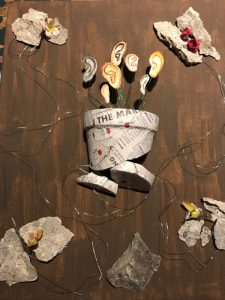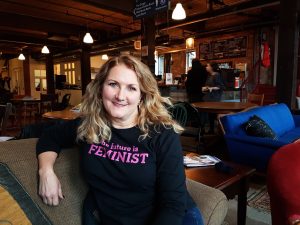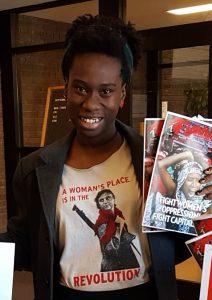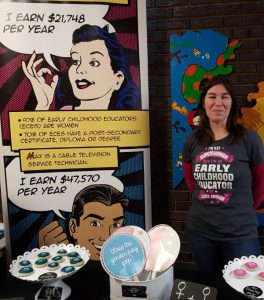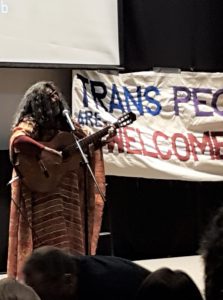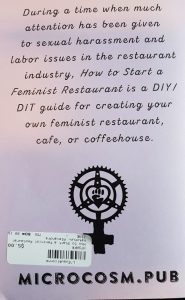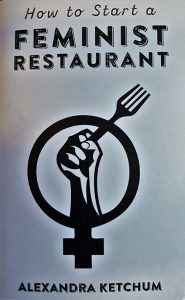
Here are 10 new songs for us to march to on Sunday, March 8, for International Women’s Day. I believe that working towards equality is a balance between doing our own inner work and taking action in the world. We must be able to honour our pain and the learning we still need to do, and also look outwards to see where there is injustice in our communities and step forward proactively.
The artists below are each striving for equality in their own way, using their platforms and voices to help us all learn and grow. We are each here to contribute to that greater purpose. Let this #IWD2020 be an inspiration for us on how we can march forward, and what direction we are heading in.
Bikini Kill, “Girl Soldier”
Bikini Kill, known for pioneering the Riot Grrrl movement, was one of the first all-female bands in punk to speak out against abuse and misogyny. “Girl Soldier,” truly an anthem to march to, points to the irony of men fighting overseas when there is a war happening on our own homes against women, women’s lives, women’s bodies, women’s rights. Seen here in a live video from the early ’90s with “Turn Off Your TV” draped behind them, Bikini Kill inspired a revolution and called us all to action. 2020 sees them reuniting in a world that just might be ready for their message.
Haviah Mighty, “In Women Colour”
Brampton rapper Haviah Mighty made history in 2019 when she became the first female rapper to ever win a Polaris Prize. The opening track to her album, 13th Floor, cuts hard to the truth of how racist and misogynistic our world (let alone the music industry) still is. She tells her powerful story, how none of it could break her, and now as she breaks boundaries with her art, she is changing the landscape for Black women in this country.
Backxwash, “F.R.E.A.K.S”
Rising Montreal rapper Backxwash identifies as queer and a witch—two communities that have historically been broken through hateful, patriarchal culture. F.R.E.A.K.S is an anthem to all the incredible people existing in the margins of society who are changing our culture by showing up unapologetically. Historical change has always come from queer and marginalized communities, pushing the restricted boundaries of normalcy and redefining identity. Today we celebrate all the amazing freaks.
Riit, “qaumajuapik”
Riit, a Juno-nominated and rising artist from Nunavut, is an embodiment of the slow but real change beginning to happen in the music industry. Her Inuktitut lyrics and throat singing speak of her experience growing up in the Northern Territories, and the strength she has found as a woman through much of it. “qaumajuapik,” the first video from her 2019 album, landed her on many incredible shows and festival lineups, a massive hurdle for an artist living in such an isolated population. Making space for voices like Riit’s is the reason our individual actions matter.
Tei Shi, “Alone in the Universe”
Colombian-born singer Tei Shi often sings on themes of love and loss but her 2019 anthem “Alone in the Universe” is a song for us to march to. If there is a God, and if she is a woman, she’s dropping the ball, Tei Shi proclaims. She follows it by promising to speak up for the sake of others, where she hasn’t been able to speak up for herself. It’s a powerful reflection on the isolation of being a woman, and the importance of taking action on behalf of ourselves and others.
Lido Pimienta, “Eso Que Tu Haces”
Lido Pimienta returns this April with her first album following her 2017 Polaris Prize win, titled Miss Colombia. “Eso Que Tu Haces” depicts the magnificent colour, warmth, and dance tradition of San Basilio de Palenque, the first place of refuge for those fleeing slavery in the Colonial Americas. Her magnetic voice and storytelling has begged Canada for years now to be accountable to continued racism in the country, and this song is no different as she sets a boundary around what can be considered a “loving action,” and what is false.
Sudan Archives, “Glorious”
This video is Black Girl Magic personified as Brittney Parks imagines her own prayer to God in the style of old oral tradition hymns. Inspired by Aisha al-Fallatiyah, the first woman to ever perform in Sudan, “Glorious” prays for money, a foundation of life in our world. It is a stunning and raw nod to intersectional equality—if we want an equal world, we have to understand that it takes marginalized genders, races, and identities that much more effort to get what they need to survive in it.
Austra, “Risk It”
Austra returns this year with new music after four years when we last heard “Future Politics,” a plea for a more equal, utopian world. “Risk It” is a call to action that can be interpreted in our love lives, our political lives, or both (since there’s really no separation in the end, is there?). As we march to the beat of this song, we can contemplate risk as an essential part of growth and change. There are places where we all need to risk it in our lives in order to see equality grow in the world.
Black Belt Eagle Scout, “Indians Never Die”
This song is a beautifully haunting comment on our Earth and the Indigenous communities that have cared for it over many generations. Colonial violence is still painfully active and destructive in the 21st century, and we are each responsible for our part in ensuring that the land we live on and the individuals who continue to care for it do not waste away. Perhaps the physical earth can be part of our vision for equality, too.
Vagabon, “Every Woman”
Do not be deceived by the gentle strum of this song. In the lyrics lives a war cry, a proclamation that Laetitia Tamko is not afraid of the battle that women face every day to exist and be free. There is a solidarity in her lyrics as we understand the importance of every woman coming together in the name of equality. We may be tired, but there’s a ways to go still before we sit down.
Related Playlists
You can also find all our playlists on Spotify under LiisBeth.
https://www.liisbeth.com/2017/07/11/summer-reset-playlist-feminist-entrepreneurs/
https://www.liisbeth.com/2018/03/15/a-change-makers-playlist/




